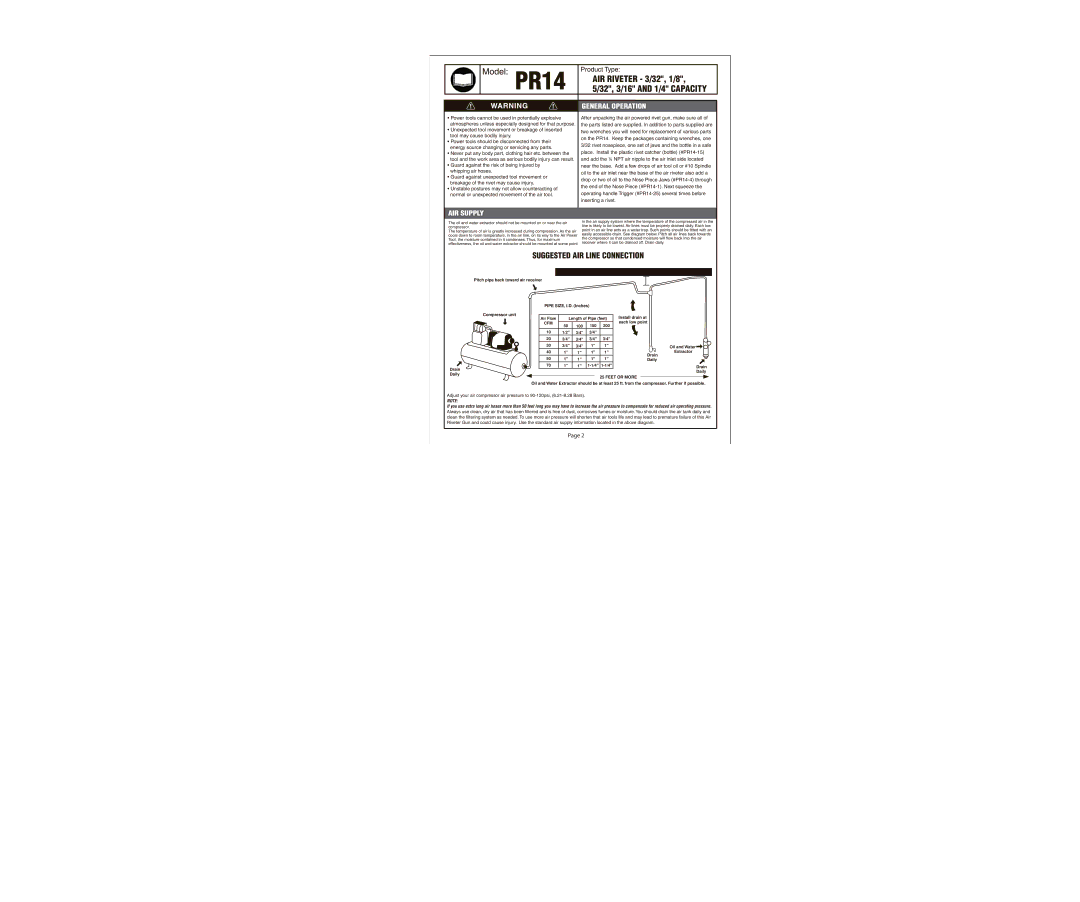
|
| PR14 | AIR RIVETER - 3/32", 1/8", |
| |
|
| 5/32", 3/16" AND 1/4" CAPACITY |
| ||
|
|
|
|
|
|
|
|
|
| GENERAL OPERATION |
|
|
|
|
|
| |
|
|
|
|
| |
• Power tools cannot be used in potentially explosive | After unpacking the air powered rivet gun, make sure all of |
| |||
atmospheres unless especially designed for that purpose. | the parts listed are supplied. In addition to parts supplied are |
| |||
• Unexpected tool movement or breakage of inserted | two wrenches you will need for replacement of various parts |
| |||
tool may cause bodily injury. |
| ||||
on the PR14. Keep the packages containing wrenches, one |
| ||||
• Power tools should be disconnected from their |
| ||||
3/32 rivet nosepiece, one set of jaws and the bottle in a safe |
| ||||
energy source changing or servicing any parts. |
| ||||
place. Install the plastic rivet catcher (bottle) |
| ||||
• Never put any body part, clothing hair etc. between the |
| ||||
tool and the work area as serious bodily injury can result. | and add the ¼ NPT air nipple to the air inlet side located |
| |||
• Guard against the risk of being injured by | near the base. Add a few drops of air tool oil or #10 Spindle |
| |||
whipping air hoses. | oil to the air inlet near the base of the air riveter also add a |
| |||
• Guard against unexpected tool movement or |
| ||||
drop or two of oil to the Nose Piece Jaws |
| ||||
breakage of the rivet may cause injury. |
| ||||
the end of the Nose Piece |
| ||||
• Unstable postures may not allow counteracting of |
| ||||
operating handle Trigger |
| ||||
normal or unexpected movement of the air tool. |
| ||||
|
|
|
| inserting a rivet. |
|
|
|
|
|
|
|
AIR SUPPLY
The oil and water extractor should not be mounted on or near the air compressor.
The temperature of air is greatly increased during compression. As the air cools down to room temperature, in the air line, on its way to the Air Power Tool, the moisture contained in it condenses. Thus, for maximum effectiveness, the oil and water extractor should be mounted at some point
in the air supply system where the temperature of the compressed air in the line is likely to be lowest. Air lines must be properly drained daily. Each low point in an air line acts as a water trap. Such points should be fitted with an easily accessible drain. See diagram below. Pitch all air lines back towards the compressor so that condensed moisture will flow back into the air receiver where it can be drained off. Drain daily.
SUGGESTED AIR LINE CONNECTION
Pitch pipe back toward air receiver
PIPE SIZE, I.D. (Inches)
Compressor unit
Drain
Daily
Air Flow | Length of Pipe (feet) | Install drain at |
| |||
CFM |
|
|
|
| each low point |
|
50 | 100 | 150 | 200 |
| ||
|
|
| ||||
10 | 1/2" | 3/4" | 3/4" |
|
|
|
20 | 3/4" | 3/4" | 3/4" | 3/4" |
|
|
30 | 3/4" | 3/4" | 1" | 1" |
| Oil and Water |
40 | 1" | 1" | 1" | 1" | Drain | Extractor |
50 | 1" | 1" | 1" | 1" |
| |
Daily |
| |||||
70 | 1" | 1" |
| Drain | ||
|
|
|
|
|
| Daily |
25 FEET OR MORE
Oil and Water Extractor should be at least 25 ft. from the compressor. Further if possible.
Adjust your air compressor air pressure to
NOTE:
If you use extra long air hoses more than 50 feet long you may have to increase the air pressure to compensate for reduced air operating pressure. Always use clean, dry air that has been filtered and is free of dust, corrosives fumes or moisture. You should drain the air tank daily and clean the filtering system as needed. To use more air pressure will shorten that air tools life and may lead to premature failure of this Air Riveter Gun and could cause injury. Use the standard air supply information located in the above diagram.
Page 2
